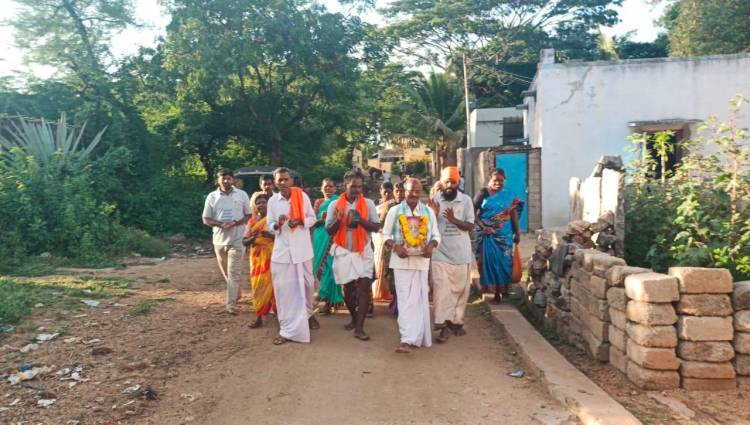[GHHF] Nagara Sankirtana was conducted in Naraynapuram Village on Vijayadashami Day to create spiritual clime in the environment.
 On Vijayadashami today in Narayanapuram village, Nagara Sankirtana program was successfully conducted from Kollapuramma temple to Anjaneya Swamy temple on behalf of Global Hindu Heritage Foundation.
On Vijayadashami today in Narayanapuram village, Nagara Sankirtana program was successfully conducted from Kollapuramma temple to Anjaneya Swamy temple on behalf of Global Hindu Heritage Foundation.
Nagara Sankeerthana is a traditional Indian practice where a group of people sing hymns while walking through residential areas. The practice is also known as Nagar Kirtan.
Here are some details about Nagara Sankeerthana:
• What it involves: A group of people walk through residential areas while singing holy hymns.
• Where it's practiced: It's a tradition in Indian religions.
• How it's performed: Some groups perform Nagara Sankeerthana on the first Sunday of every month. They may also include patriotic songs, folk songs, vachanas, and tattva padas in their performances.
The nagara is also a percussion instrument used in temples across South India. In Sikh traditions, the naghara is a large ceremonial drum used in Gatka performances.
All the devotees travel on foot by holding a Gods or Goddesses picture or a flag. Devotees chant the divine name of the God at various locations. Nagara Sankeertana eliminates the negative energy and fills the positive energy in the area.
There is a big difference between Keerthanam and Sankeerthanam. Keerthanam is an individual affair. It is sung by an individual for the fulfilment of his prayers. Sankeerthana aims at the well-being of the whole universe. This is also described as Samajika bhajans (community singing). This method of singing bhajans was first initiated by Guru Nanak, the founder of Sikhism. Sankeerthana aims at demonstrating unity in diversity. When all the participants combined to sing in unison with one voice, it is described as Sankeerthana.
In Hinduism, Bengali saint Chaitanya Mahaprabhu[3] propagated ideas of bhakti, or devotion to a personal God, through kirtan (collective recitation of hymns) and nagar kirtan (kirtan the in form of religious processions),[4] and is credited in the Vaishnava tradition with introduction of the custom.[5] The congregational singing of Chaitanya was done to folk tunes and accompanied by the boisterous booming of drums and cymbals.[6]
Sri Sathya Saibaba says, “You came into this world alone, with no companion, isn’t it? During the years of life, you collected all these kith and kin, you gathered wife and children, friends, and acquaintances who attached themselves to you. When you return to the realm from which you came, you enter the portals alone, with no one to keep company. So too, let it be with the journey called Nagar Sankeerthan. Come into the street alone; collect kith and kin, if they come unto you; move with them unconcerned and unaffected; revel in your own sweet solitariness; finally enter your home, with the satisfaction that your job is well done. Fellows may laugh at you as insane; but this insanity is infectious and very soon, even the irreverent will be initiated into the fold. No organization should have as its’ office-bearers people who do not join the Nagar Sankeerthan party. They must have no qualms, no hesitation, no tremors of doubt.
The Lord is closest to you, He is the mother, father, teacher, friend, guide and guardian. Call on Him, and He responds immediately. From dawn to dusk, spend every minute in His company. That is the reason why I have directed that every Sathya Sai Organization must arrange for Nagarasankeerthana in the pre- dawn Brahma-muhuurtham (early morning). It is a mission of Love, and all will welcome it. It is a great act of social service to waken people with the Name of God. It is a purificatory pilgrimage, casting off the foul fumes of anger and hate that infest the atmosphere. Moving slowly along the quiet streets, in the cool refreshing morning hours, singing aloud the Name of God, with ecstatic thrill, filling the ears of your fellowmen with the same---this is good sadhana, the best with which you can start the new day.
Your donations are appreciated.
By Zelle: ghhfusaorg@gmail.com
PayPal: savetemples.org
By Check: Or you can send a check payable to GHHF, 14726 Harmony Lane, Frisco, TX 75035.
It is tax-deductible.
By Rupees: call 601-918-7111; +91 83096 43979






















 Urgent support needed for Bangladesh Hindus
Urgent support needed for Bangladesh Hindus 







